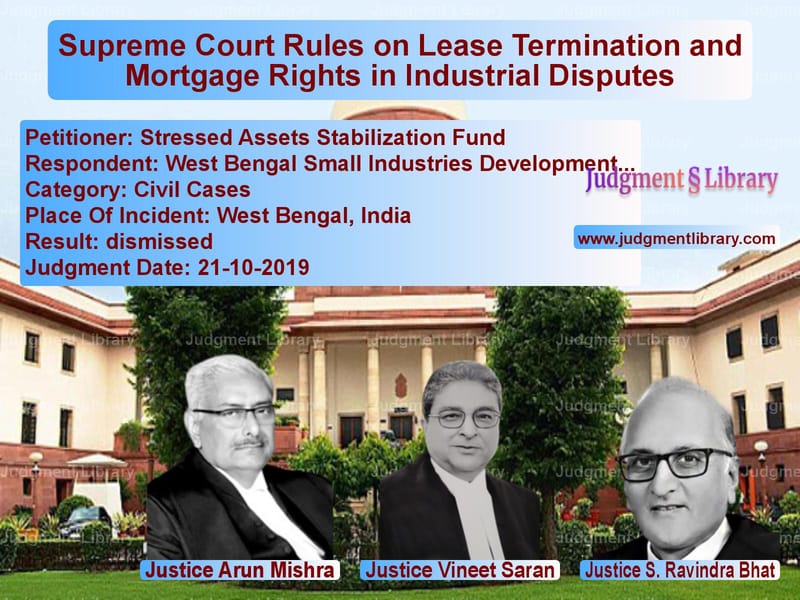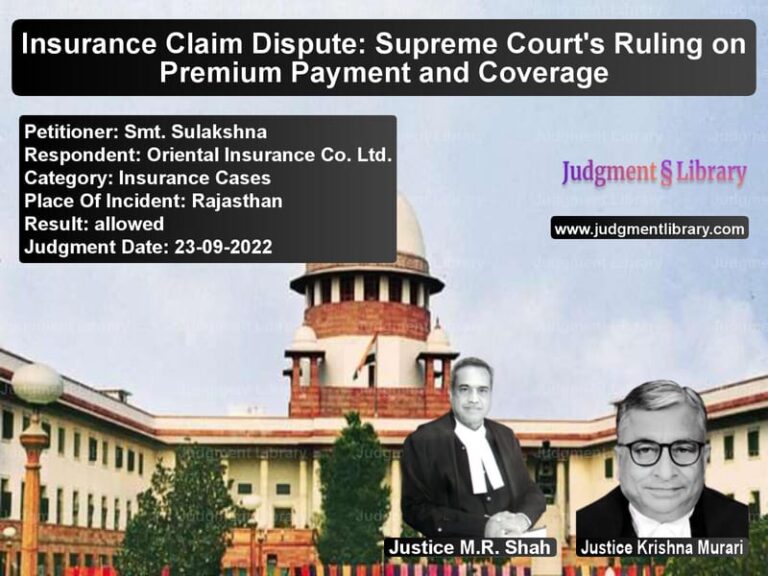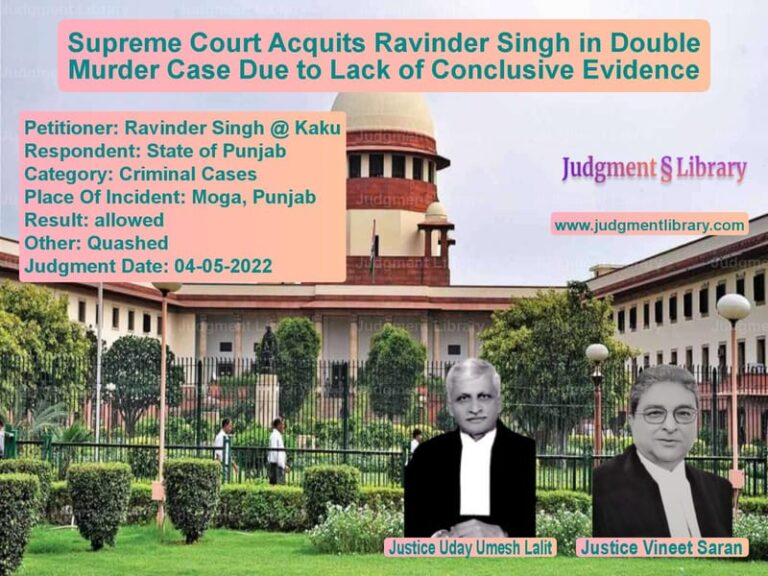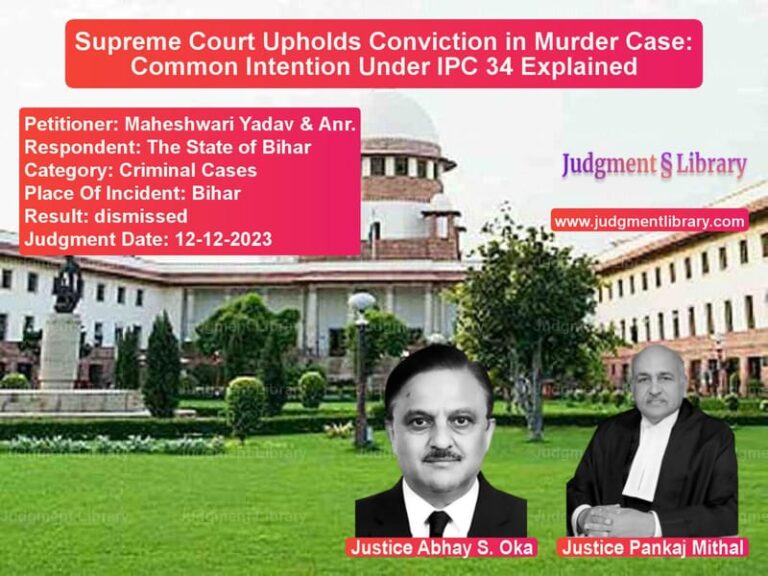Supreme Court Rules on Lease Termination and Mortgage Rights in Industrial Disputes
The case of Stressed Assets Stabilization Fund vs. West Bengal Small Industries Development Corporation Ltd. revolved around the complex issue of whether a mortgagee (financial institution) could assert greater rights than the lessee in a leased property, once the lease had been terminated due to the lessee’s failure to comply with conditions. The Supreme Court was called upon to decide the validity of lease termination, the priority of mortgage rights, and the scope of the lessor’s authority over the leased industrial land.
Background of the Case
The dispute originated when the West Bengal Small Industries Development Corporation (WBSIDC) terminated the lease granted to Wellman Incandescent India Ltd. due to the cessation of industrial activities on the leased land. This land had previously been mortgaged by Wellman to the Industrial Development Bank of India (IDBI) as security for loans. Upon Wellman’s financial collapse, its assets, including mortgaged properties, were transferred to the Stressed Assets Stabilization Fund (SASF), an entity created by the government to manage and recover stressed financial assets.
WBSIDC sought to regain possession of the property after terminating the lease, asserting that Wellman had ceased industrial operations beyond the permissible period. The High Court ruled in favor of WBSIDC, prompting SASF to appeal to the Supreme Court.
Key Legal Issues
- Whether WBSIDC had the legal right to terminate the lease due to the non-use of the premises for industrial purposes.
- Whether SASF, as a mortgagee, could assert rights superior to those of Wellman (the lessee).
- Whether the lease termination was valid and enforceable under applicable state laws.
- Whether the mortgage rights of SASF could override the lessor’s claim over the leased land.
Petitioners’ Arguments (SASF)
The counsel for SASF argued:
- The lease should not have been terminated without due process, as it affected third-party rights (i.e., mortgagees like SASF).
- The lease was granted for 99 years, making it unreasonable to terminate it based on short-term inactivity.
- The termination deprived SASF of its ability to recover substantial public funds amounting to Rs. 42 crores.
- The mortgage on the leasehold property gave SASF rights to enforce its claim against the asset.
Respondents’ Arguments (WBSIDC)
The counsel for WBSIDC contended:
- The lease agreement explicitly stated that the lessee must continue industrial activities, and failure to do so for a prolonged period led to automatic lease termination.
- The lease termination had attained finality and was not challenged by Wellman itself or by the official liquidator.
- The mortgagee (SASF) could not claim rights greater than the lessee and had no independent right to challenge the lease termination.
- The lease terms granted WBSIDC absolute authority to reclaim the land in cases of violation.
Supreme Court’s Observations
The Supreme Court analyzed the validity of the lease termination and the rights of the mortgagee. The Court made the following key observations:
“A mortgagee steps into the shoes of the mortgagor and can have no better rights than the original lessee. If the lessee’s rights are extinguished due to non-compliance, the mortgagee’s rights also cease to exist.”
Additional observations included:
- The lease was terminated in accordance with the contract, and the lessee did not challenge this termination.
- As the mortgagee’s rights depended entirely on the lessee’s rights, SASF could not assert claims greater than those of Wellman.
- Industrial land allocation policies justified the termination of leases where manufacturing activities ceased.
- The High Court had correctly ruled that WBSIDC’s claim over the property superseded that of the financial institution.
Final Verdict
The Supreme Court ruled:
- The lease termination by WBSIDC was valid and legally enforceable.
- SASF, as a mortgagee, had no independent right to challenge the termination or claim ownership.
- The appeal by SASF was dismissed, affirming the High Court’s ruling in favor of WBSIDC.
- No separate compensation was awarded to SASF, as it had no superior claim over the property.
Legal and Policy Implications
The ruling has significant implications for industrial lease agreements and financial institutions:
- Reinforcement of Lease Terms: The judgment upholds the enforceability of lease clauses requiring continued industrial activity.
- Mortgage Rights Are Not Absolute: Financial institutions must ensure that their mortgage agreements align with lease conditions.
- Protection of Industrial Land Use Policies: State governments have the authority to reclaim industrial land if lessees fail to utilize it for the intended purpose.
- Guidance for Financial Institutions: Lenders must conduct due diligence on lease conditions before accepting leased properties as collateral.
Conclusion
The Supreme Court’s decision in this case reaffirms the principle that a mortgagee cannot have rights superior to those of the lessee. By upholding the lease termination, the ruling protects industrial development policies and ensures that land allocated for industrial purposes is used efficiently. This decision serves as a crucial precedent for future disputes involving leased properties and mortgage rights.
Petitioner Name: Stressed Assets Stabilization Fund.Respondent Name: West Bengal Small Industries Development Corporation Ltd..Judgment By: Justice Arun Mishra, Justice Vineet Saran, Justice S. Ravindra Bhat.Place Of Incident: West Bengal, India.Judgment Date: 21-10-2019.
Don’t miss out on the full details! Download the complete judgment in PDF format below and gain valuable insights instantly!
Download Judgment: Stressed Assets Stab vs West Bengal Small In Supreme Court of India Judgment Dated 21-10-2019.pdf
Direct Downlaod Judgment: Direct downlaod this Judgment
See all petitions in Property Disputes
See all petitions in Contract Disputes
See all petitions in Landlord-Tenant Disputes
See all petitions in Specific Performance
See all petitions in Judgment by Arun Mishra
See all petitions in Judgment by Vineet Saran
See all petitions in Judgment by S Ravindra Bhat
See all petitions in dismissed
See all petitions in supreme court of India judgments October 2019
See all petitions in 2019 judgments
See all posts in Civil Cases Category
See all allowed petitions in Civil Cases Category
See all Dismissed petitions in Civil Cases Category
See all partially allowed petitions in Civil Cases Category







